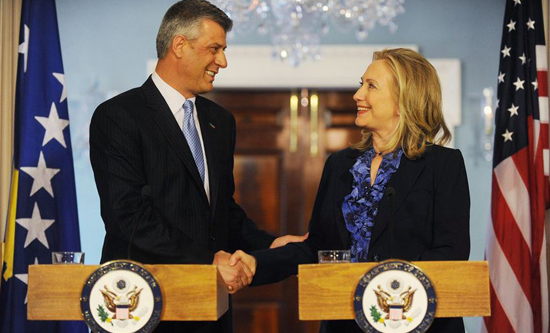
On 26 February Kosovo MPs elected Hashim Thaçi as the country’s new president against a backdrop of teargas and nationwide protests.
Thaçi, the leader of the centre-right Democratic Party of Kosovo (PDK), the senior partner in Kosovo’s coalition government, had previously served as Prime Minister from 2008 to 2014. He rose to prominence in the late 1990s as the political leader of the Kosovo Liberation Army (KLA), the ethnic Albanian guerrilla organisation that received the support of NATO forces against Yugoslavia during the Kosovo War of 1998-1999. In addition to KLA war crimes, Thaçi has been on the receiving end of allegations of organised drug and organ trafficking throughout his political career – something which he has got away with due to his support for NATO. As Thaçi was sworn in, members of opposition party Vetëvendosje released tear gas in the parliamentary chamber, which has become something of a routine act of defiance in recent months, while around 1,000 anti-Thaçi demonstrators protested outside Parliament, with 21 police officers injured in the riots, according to Reuters.
Protesters, led by Vetëvendosje (the Albanian word for ‘self-determination’), an Albanian social-ethnocratic party campaigning for a unified greater Albania, are up in arms about Thaçi and Prime Minister Isa Mustafa’s role in the EU-brokered deal between Kosovo and Serbia. The deal grants more powers to Kosovo’s minority Serb population, largely living in the north of the country. It is seen by many as a concession by both governments to normalise relations with a view to eventual accession to the EU.
Kosovo is on the verge of becoming the world’s newest ‘failed state’. Unemployment stands at roughly 35% – for Kosovans under 25 the figure is almost double that – and nearly half of the population is considered to be in poverty. Anti-government and anti-Serb demonstrations have rocked Kosovo’s capital Prishtina for months, with government buildings frequently being attacked and parliamentary proceedings halted by tear gas attacks on an almost weekly basis. On 17 February, the eighth anniversary of Kosovo’s independence (2008) and the week prior to Thaçi’s election, more than 15,000 people took to the streets accusing their leaders of violating Kosovo’s constitution, and in January rioters armed with Molotov cocktails set the main government building on fire in protest against the EU-led negotiations.
This is the reality of what NATO’s intervention in the Balkans – the brainchild of Tony Blair and Bill Clinton – has created in Kosovo. Far from liberating the ethnic Albanian population, NATO carved Kosovo out as a protectorate of its own and installed a motley crew of gangsters and thugs into its government who sign lucrative investment deals with US and German companies while most Kosovans live in poverty and desperation. A recent video released by the Kosovo Ministry of Trade and Industry encouraging foreign companies to invest in the country highlighted Kosovo’s ‘low-cost workforce’ as its main selling point. Visa liberalisation remains a distant pipe dream, and between December 2014 and February 2015 almost 5% of Kosovo’s 1.8 million people travelled out of the country by the busload on dangerous – and illegal – journeys to find work in places like Austria and Germany.
Kosovo is home to the largest US military base in the Balkans – Camp Bondsteel – which can hold 7,000 soldiers. This huge complex costs the US hundreds of millions of dollars a year and contains the best hospital in the whole of Kosovo. US imperialism continues to retain this substantial military outpost in the Balkans, seventeen years after the NATO war ended.
Kosovo has produced more ISIS fighters per capita than any other country, with estimates of up to 1000 people making the trip to Syria – a direct result of Saudi-backed groups being allowed into the country by NATO post-war to spread Wahhabism among the traditionally moderate and secular Sunni Muslim population. These actions, coupled with the Serb chauvinism that emerged following the fall of socialism in Yugoslavia, have left Kosovo with a mainstream politics devoid of any progressive character, the people left to choose between wealthy and unapologetic supporters of NATO’s neo-colonial dominance or ultra-sectarian Albanian nationalists. Seventeen years since the war ended and eight since independence was nominally – but not practically – declared, it is clear that there can be no talk of Kosovan self-determination as long as its government remains installed by and compliant to imperialism.
Adrian Halilaj




